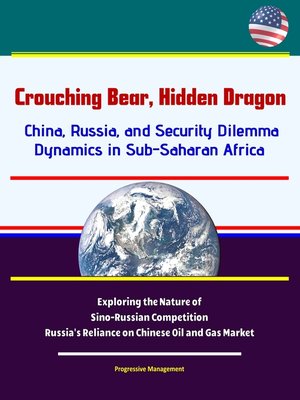Crouching Bear, Hidden Dragon
ebook ∣ China, Russia, and Security Dilemma Dynamics in Sub-Saharan Africa--Exploring the Nature of Sino-Russian Competition, Russia's Reliance on Chinese Oil and Gas Market

Sign up to save your library
With an OverDrive account, you can save your favorite libraries for at-a-glance information about availability. Find out more about OverDrive accounts.
Find this title in Libby, the library reading app by OverDrive.



Search for a digital library with this title
Title found at these libraries:
| Library Name | Distance |
|---|---|
| Loading... |
This report has been professionally converted for accurate flowing-text e-book format reproduction. The collapse of the Soviet Union left the United States as the preeminent global power. China's rise has marked it as the primary threat to the United States' top position, but its economic rise alone has not been enough, and it found a ready partner in Russia to bolster its balancing efforts. Their mutual resentment of the U.S.-led international order drove them to greater cooperation, and an evolving partnership emerged. On the surface, this partnership appears to be a solid challenger-bloc that poses a significant threat to the United States' top position. However, in the past, instances of great power competition spawned rivalries that escalated into costly back-and-forth exchanges between states that tore partnerships apart. The solidarity of the Sino-Russian partnership is seemingly facing stressors due to competition between them in Sub-Saharan Africa that may test the strength of this relationship. This thesis explores the nature of Sino-Russian competition in Sub-Saharan Africa using the concept of the security dilemma. In doing so, it finds evidence that security dilemma dynamics between China and Russia centered on Russia's growing reliance on the Chinese oil and gas market are becoming an important driver of Russia's activities in Sub-Saharan Africa.
This compilation includes a reproduction of the 2019 Worldwide Threat Assessment of the U.S. Intelligence Community.
The collapse of the Soviet Union shifted the distribution of power from a bipolar to a unipolar system with the United States remaining as the preeminent global power. Despite Francis Fukuyama touting the end of history, other states emerged to balance U.S. power and challenge its primacy. China's economic rise marked it as the primary threat to the United States' position atop the international system; yet, its economic power alone was not enough to balance U.S. power. China found a ready partner to bolster its balancing efforts in Russia after sanctions imposed by the West in the aftermath of its 2014 actions in Ukraine threatened to isolate it from the rest of the world. China stepped in to bolster Russia's economy with investments and increased oil and gas purchases, and Russia returned the favor by providing China with greater access to its advanced weaponry. Their mutual resentment of the U.S.-led international order drove them to even greater cooperation, and an evolving partnership emerged strengthened by a perceived common threat and the desire to create a more multipolar international system. On the surface, this partnership appears to be a solid challenger-bloc that poses a significant threat to the United States' top position.







